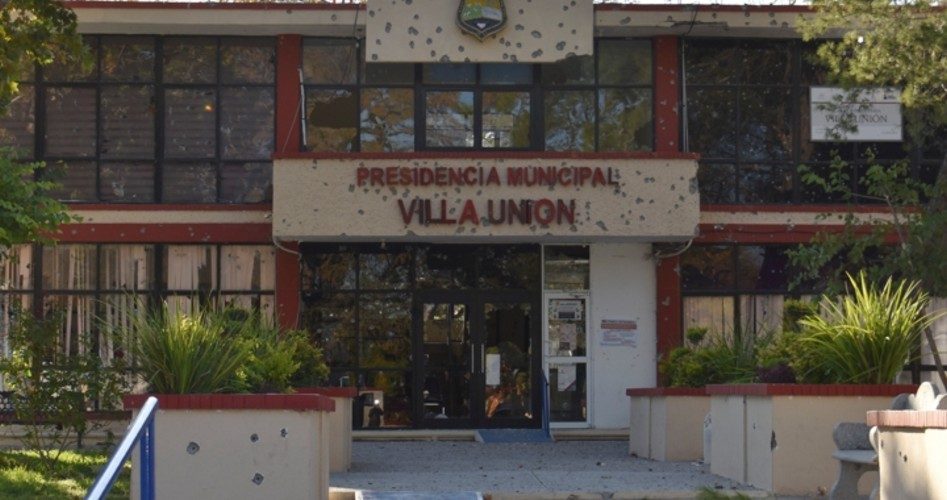
Three days after President Trump said something must be done about the drug cartels that have attacked Mexican security forces with impunity, they did so again on Saturday. The next day, Mexican President Andrés Manuel López Obrador said he will not wage a “war on drugs.”
The cartel gunmen killed 19 people in an attack against a Mexican town hall less than an hour from the U.S. border, but the gunfight did nothing, apparently, to convince López Obrador that President Trump was right in announcing he would designate the cartels as terrorist organizations.
Indeed, Obrador’s foreign secretary, Marcelo Ebrard, will meet with U.S. Attorney General William Barr this week to try to stop the designation.
Happy Anniversary, Obrador
Late Sunday, the Washington Post reported that cartel thugs hit a town hall in Villa Union, in the state of Coahuilla, which borders Texas. Villa Union sits about 43 miles south of Eagle Pass, Texas.
The attackers were with the Cartel of the Northeast, the Post reported, “an offshoot of the once-powerful Zetas, which is based in the border city of Nuevo Laredo. Several groups that spun off from the Gulf and Zetas cartels are fighting with each other in Tamaulipas and nearby states.”
The gunmen hit the town in 14 trucks, “some of them armored and bearing the cartel’s logo,” the Post reported, and attacked the town hall. After 90 minutes, the cartel soldiers fled, but Mexican cops and soldiers “backed by army helicopters, chased them in an operation that stretched into Sunday morning.”
The attackers killed four state policemen and kidnapped and murdered two civilians. Authorities killed 13 of the attackers.
Obrador — No Drug War
Next day, Obrador delivered a speech on the anniversary of his inauguration with this line: “We will never repeat this absurd and deranged strategy, we will not risk the lives or prestige of the armed forces, nor use them for inhumane actions.”
And Obrador is also trying to stop Trump from designating the cartels as terrorists, which would open the door for the United States to attack them if Mexico won’t. On November 5, Trump tweeted that the United States would help Mexico “wipe [the cartels] off the face of the earth. We merely await a call from your great new president!”
On Tuesday, appearing on Fox talker Bill O’Reilly’s radio program, the Post noted, Trump said the time had come to crack down.
“I’ve actually offered him to let us go in and clean it out and he so far has rejected the offer,” Trump told O’Reilly. “But at some point, [something] has to be done.”
What that something is, however, is the question.
“Mexico will never accept any action that violates our national sovereignty,” Ebrard tweeted last week after Trump’s remarks. “We will act firmly. I have sent our position to the U.S. as well as our resolution on combating transnational organized crime.”
Said Obrador on Wednesday, “Cooperation, yes, interventionism, no.”
Problem is, Obrador has said he won’t wage war against the cartels, which raises the question of what Trump might do if the cartel violence spills into the United States.
Trump has been contemplating the terror designation since March. Barr travels to Mexico this week to meet with Ebrard.
Out of Control
That Obrador can’t handle the cartels was clear long before Saturday’s brazen attack in Villa Union.
On October 17, Mexican security forces lost a battle to Sinaloa Cartel gunmen during an attempt to arrest Ovidio Guzmán López, the son of Joaquín “El Chapo” Guzmán, the jailed drug kingpin.
The younger Guzmán was holed up in Culiacán in Mexico’s west coast state of Sinaloa when 35 troops attempted to arrest him pursuant to an extradition request from the United States. Federal prosecutors indicted him for trafficking cocaine, methamphetamine, and marijuana.
The raid failed when a much larger force of Sinaloa Cartel soldiers attacked and, as the Associated Press described the battle, “unleashed mayhem elsewhere, taking over toll booths and main roads into the city. Men carrying high-caliber weapons blocked major intersections.”
After a “ferocious shootout,” eight were dead and 20 wounded.
“It was the third bloody and terrifying shootout in less than a week between security forces and cartel henchmen, raising questions about whether President Andrés Manuel López Obrador’s policy of avoiding the use of force and focusing on social ills is working,” AP reported.
But worse than that, authorities released Guzmán after it was over.
A former agent with the U.S. Drug Enforcement Administration told AP the loss was a “sign that the cartels are more powerful” than Obrador’s government, and “sends them the message that if they capture a member of the cartel, all they have to do is go in the city and intimidate the citizenry and security forces.”
Saturday’s attack is proof the cartels received Obrador’s message.
Photo: AP Images


